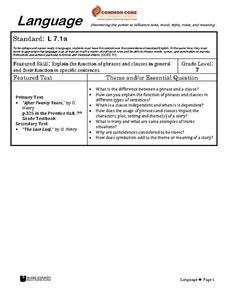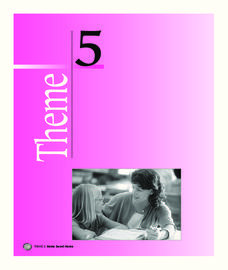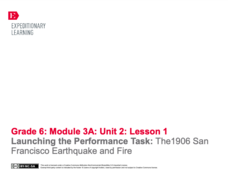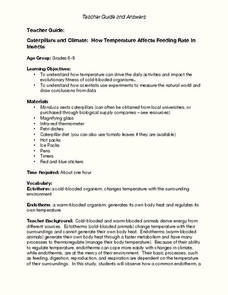Curated OER
The Spread of Aids
This is an effective simulation of how communicable diseases such as AIDS can be spread throughout a population. Classmates exchange samples from their individual cups of liquid: one of them containing a dilute NaOH solution, and the...
Deliberating in a Democracy
Euthanasia
Students analyze euthanasia as a possible way to die. In this controversial lesson, students reflect and discuss euthanasia as a possible way to enter death. Classroom discussion allows students to voice their opinion and...
Curated OER
People Behind the Parks
Explore U.S. geography with your class by viewing a documentary. Show a portion of the Ken Burns documentary "The National Parks," and identify the individuals responsible for keeping the parks in order. Elementary and middle schoolers...
Curated OER
Healthy Relationships
Teens, dating, relationships, breaking up, what's appropriate dating behavior? Go through this PowerPoint presentation and discuss all of these things and more. Too often, teens are not sure what's appropriate and what's inappropriate...
Eye On Education
I Say Tomato, You Say To-Mah-To
Turn your junior high talkers into effective arguers. Introduce these budding lawyers to skills that show how to support a claim, decide what clear reason is, and how to use evidence to support an argument. Time is scheduled for class...
Wake County Public Schools
Language
Have your class doing everything from reading literature, analyzing literary devices, identifying independent and dependent clauses, discussing, and writing creatively with the rich resource found here. After a mini lesson on independent...
Scholastic
Writing Letters to the Chancellors of the Academy of American Poets
To celebrate National Poetry Month, young writers focus on the role letter writing has played in the development of poets. They begin by journaling three to five associations to a writing prompt that requires them to identify their...
Curated OER
Dulce et Decorum est by Wilfred Owen
It is entirely fitting and proper that Wilfred Owen’s powerful “Dulce et Decorum Est” is the poem used for an exercise in close reading, discussion, analysis, and argumentative writing. Class members discuss focus questions in pairs,...
ARKive
Penguin Diversity – Mask Making
Penguins are very diverse and well-adapted birds; they live on islands, in warm and cold climates. Little ones examine penguin diversity and discuss the highly functional adaptive traits that have helped them survive in some of the...
Houghton Mifflin Harcourt
Home Sweet Home: Extra Support Lessons (Theme 5)
Home Sweet Home is the theme of a unit comprised of extra support lessons. Scholars reinforce concepts through chants, grand discussions, and practice worksheets. Topics include digraphs, blending phoneme, long vowels, final sounds,...
It's About Time
The Earth-Moon System
Explore the earth-moon system with blossoming astronomers in this fun-filled activity. They begin by investigating lunar phases and differentiating between each. They continue the activity by learning about tidal forces and how these are...
Virginia Department of Education
Evidence of Evolution
What an impression fossils make! In this activity, aspiring paleontologists view fossils and construct a timeline to further understand how the lack of natural adaptation caused historical organisms to become extinct. While they...
Boston University
South African Short Stories: Apartheid, Civil Rights, and You
How are short stories from South Africa connected to issues of civil rights in the United States? A unit plan uses South African short stories to discuss issues such as apartheid, colonization, and civil rights. Questions and activities...
EngageNY
Preparing for the Mid-Unit Assessment: Planning the Children’s Book
Pupils complete a My Children's Book Plan worksheet to carefully prepare for a narrative writing project. Scholars also continue working in their groups from lesson plan two, using their scavenger hunt worksheets to discuss what makes a...
Teaching Tolerance
Understanding the Prison Label
Break the chain. An engaging lesson examines why it is so hard to break free of the prison system in the US. Academics participate in a reader's theater, read primary sources, and discuss their thoughts. The lesson explains the hardships...
EngageNY
Launching the Performance Task: The1906 San Francisco Earthquake and Fire
Picture that! Pupils view photographs of the aftermath of the 1906 San Francisco earthquake and fire, discussing what they know and wonder about each image. Then, scholars watch a short video about the historic event and complete a KWL...
NPR
Teaching Podcasting: Choosing a Topic
Pick a topic, any topic! Working in small groups, scholars choose three topics they think would make interesting podcasts. Next, each group shares their ideas with the class to narrow down their choices.
Museum of the American Revolution
Historical Analysis: Objects Tell Stories
Dig this! Young archeologists discover what objects teach us about the past. The activity uses an image of a Revolutionary War artifact to help historians practice analyzing the past. Scholars study the object and complete a worksheet to...
Curated OER
Parades
Third and fourth graders examine the history of parades and investigate guidelines and items needed for a parade. They listen to a speaker discuss how to organize a parade. In small groups, learners organize various items for the event...
Curated OER
Caterpillars and Climate: How Temperature Affects Feeding Rate In Insects
Do you eat more when you are hot or when you are cold? Young scientists observe the eating pace of two caterpillars at different temperatures. The differences in endotherm and ecotherm animals' ability to adjust to temperature change...
John F. Kennedy Presidential Library & Museum
Ask Not What Your Country Can Do for You
Ask not what the lesson here can do for you, but what you can do with the lesson. The answer is quite a lot! Young scholars revisit JFK's famous inaugural address with a focus on his plea for civic engagement. There's a...
US Institute of Peace
Characteristics of Peacebuilders
Can anyone become a peacebuilder? A lesson on character education challenges scholars to examine the characteristics of well-known peacebuilders. Pupils then look within themselves to discover their own strengths as they relate to...
US House of Representatives
Women Pioneers on Capital Hill, 1917–1934
As part of a study of the women elected to Congress from 1917 to 1934, groups research and then design a museum exhibit that describes the life and the congressional service of one of these women.
US House of Representatives
Traditionalist, Feminist, and the New Face of Women in Congress, 1955–1976
As part of a study of women in Congress, class members read the contextual essay, "A Changing of the Guard; Traditionalist, Feminist, and the New Face of Women in Congress, 1955–1976." Groups then research a woman serving during this...

























